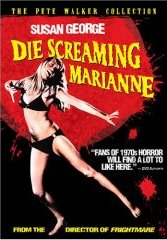
Peter Walker was a maverick of controversial horror cinema in a time when the genre was just beginning to escape the restrained effects of suggestive supernatural cinema. Finding horror in the midst of the everyday, Walker evoked terror at the breakfast table, exchanging cliché Gothic landscapes and symbols for a scathing modernity. Maligned when he should have been celebrated, his shocking yet thoughtful treatment of socially taboo subjects peeled back the wounds of polite English society with the precision of a scalpel. In short, Walker evoked dread not only with increased violence and sexuality but, more importantly, grounded horror elements within the context of contemporary social ills and controversies.
Capable of telling carefully structured stories of suspense and sensationalistic violence, Walker's approach to terror was as intelligent as it was fetishistic. While never quite a stylist, he was certainly a conscientious craftsman, lacing the stalk-and-slash primacy of his films with intelligence and emotional verve. His darkly beautiful fantasies often celebrate the very social injustice, intolerance, and political corruption that they condemn. Diving head-first into subjects that his era wished to ignore, Walker not only makes his audience face the distasteful, he makes them choke on it. Attacking the hypocrisy of religious fanaticism in The Confessional, an intolerant legal system in The House of Whipcord, the sanctity of the family in Frightmare, the nature of appearances in Schizoid, and, finally, subverting perception in The Comeback, Walker's most successful films interweave a contradictory desire for/repulsion of the acts of murder and degradation that his characters -- both victims and victimizers -- commit. While Die Screaming Marianne, the latest offering from Media Blasters, isn't one of his most successful films, nor a very horrific one, it does achieve a basic level of suspense.
In a plot more devoted to British mystery pot-boilers than the psycho-sexuality for which Walker would later be known, Die Screaming Marianne features delectable Marianne McDonald (Susan George), a 'free spirit' fleeing Spain (and her father's corrupt influence). A few weeks shy of her 21st birthday, fearing her father's influence, she meets up with rat-faced Sebastian and speeds away to England. Secretive and cruel hearted, he wishes her to marry him. Instead she joins up with his friend Eli Frome. Knowing that she will inherit a large sum of money and incriminating documents on her birthday, her father, a dethroned magistrate (referred to, tellingly enough, as 'the Judge') and her scheming, psychopathic half-sister Hildegarde, will do anything to silence Marianne. For no apparent reason, Marianne and Eli foolishly return to the seas-side family estate, where a convoluted plot of secrets and death unravels.
Lacking the eerie resonance and psychological deviancy that made his warped characters so memorable in Frightmare and The Confessional, neither the story of Die Screaming Marianne nor its structure possess the nightmare-illogic of Walker's other cinema. Also missing is the expected depth of social critique. Murry Smith's screenplay is routine, particularly in its staid observance to the conventions of such traditional prototypes as Les Diaboliques and Agatha Christie novels. Still, despite these obvious flaws, the film entertains as a serviceable who-done-it?, serving up its formalized stew of cat-and-mouse in believable (of not graphic) style. Die Screaming Marianne features an interesting cast, credible performances, and wonderfully shot scenery in London and Portugal. While murders are plentiful, they are filmed with a certain reluctance, even hesitancy. One area where Walker's mean-spirited sensibilities are already apparent is his refusal to play everything safe. In Marianne, as in Frightmare and Whipcord, innocence is a meaningless term, and the decent are just as often brutalized as the guilty.
This Shriek Show edition presents the picture in a serviceable widescreen format, with colors bright and solid, and the picture surprisingly clean. While a bit of speckling and scratching occurs, such instances are rare, detracting very little from the overall presentation. Audio in English Mono and 5.1 Surround Sound is clean. Extras are similar in quality and quantity to the other Media Blaster discs in the Pete Walker Collection, including an audio commentary that discusses the production, the moral atmosphere of the time, and the turmoils of mounting a production. Walker comes across as both a professional and as a fellow you would like to have a beer with, as clever as he is self-effacing, loving his projects but not taking either them -- or himself -- too seriously. A still gallery, theatrical trailer, informative if brief text notes, and trailers for other Walker titles round out this uneven if historically significant film.
Review by William P. Simmons
| Released by Shriek Show |
| Region 1 NTSC |
| Not Rated |
| Extras : see main review |